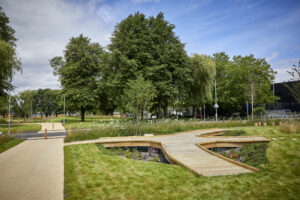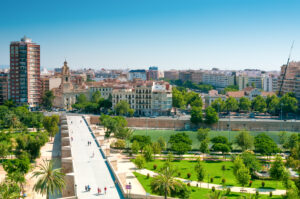Exchange on nature-based solutions with GrowGreen
The work carried out by the GrowGreen cities under the project has generated extensive knowledge, best practices and lessons learnt on the implementation on nature-based solutions (NBS) in different urban contexts. In order to strengthen learning and peer to peer exchange, GrowGreen organised an “Exchange on NBS with GrowGreen”, held on 28th January, to share the knowledge generated by the project and its achievements with a selected group of partner cities in Europe and internationally, supporting them in their NBS journey.
The objective of this exchange was to find out about the partner cities’ main interests and ambitions for learning from GrowGreen on the development of Nature-based solutions and their implementation, to create pathways for cooperation.
In addition to the GrowGreen cities, many partner cities participated in the meeting from various countries in Europe and beyond, such as Belišće, Drniš, and Ludbreg (Croatia), Nis (Serbia), Rennes (France), Kraków and Tychy (Poland), Maranello (Italy), Salford (UK), Egelsbach (Germany), Bratislava (Slovakia), and Campinas (Brazil).
An overview of the GrowGreen cities’ achievements highlighted the importance and role of urban NBS.
 Dave Barlow, Green Infrastructure and Biodiveristy Officer at Manchester City Council, explained that despite the dense and growing population, 50% of the environment of the city of Manchester is green, covered by green and blue areas. The city witnessed an evolution from a policy perspective, towards a better integration of the role of the natural environment. In 2009, the first Climate Change Strategy for Manchester was developed, shifting the focus on both green and blue infrastructure for climate resilience. Further, Manchester’s Local Plan led to the development of the Manchester Green and Blue Infrastructure Strategy in 2015 and the new version in 2021. The Strategy won the 2018 Award by CIEEM, a national award for best practices. To date, 100 million euros have been committed on investments for green infrastructure. Finally, Dave listed other important strategies for the city of Manchester, such as “Our Rivers, Our City” and “My wild city” which were produced as part of the GrowGreen project. GrowGreen has been the catalyst for all these actions, through the implementation of projects on the ground which are contributing to improving the quality and function of the city’s landscape towards more climate resilience.
Dave Barlow, Green Infrastructure and Biodiveristy Officer at Manchester City Council, explained that despite the dense and growing population, 50% of the environment of the city of Manchester is green, covered by green and blue areas. The city witnessed an evolution from a policy perspective, towards a better integration of the role of the natural environment. In 2009, the first Climate Change Strategy for Manchester was developed, shifting the focus on both green and blue infrastructure for climate resilience. Further, Manchester’s Local Plan led to the development of the Manchester Green and Blue Infrastructure Strategy in 2015 and the new version in 2021. The Strategy won the 2018 Award by CIEEM, a national award for best practices. To date, 100 million euros have been committed on investments for green infrastructure. Finally, Dave listed other important strategies for the city of Manchester, such as “Our Rivers, Our City” and “My wild city” which were produced as part of the GrowGreen project. GrowGreen has been the catalyst for all these actions, through the implementation of projects on the ground which are contributing to improving the quality and function of the city’s landscape towards more climate resilience.
 Ignacio Lacomba, from the Municipality of Valencia, showed the history of Valencia in dealing with the consequences of climate change, in particular floods. The city is committed to become carbon neutral and has joined the European Commission’s “100 Climate neutral Cities by 2030 ” initiative. An Urban strategy “Valencia 2030” was developed for the city, presenting four main actions to create a healthy, sustainable, shared, and entrepreneurial city. Ignacio then provided an overview of the different projects carried out in and around Valencia, such as the Turia garden, one of the largest urban parks in Spain. This was previously the Turia riverbed, which has now been transformed into nine kilometres of green space. Other important projects are Per l’Horta, La Albufera, Racò de l’Olla, Dunas del Saler, and the Orchard. New interventions are planned for the recovery of the new riverbed in the southern part of the city.
Ignacio Lacomba, from the Municipality of Valencia, showed the history of Valencia in dealing with the consequences of climate change, in particular floods. The city is committed to become carbon neutral and has joined the European Commission’s “100 Climate neutral Cities by 2030 ” initiative. An Urban strategy “Valencia 2030” was developed for the city, presenting four main actions to create a healthy, sustainable, shared, and entrepreneurial city. Ignacio then provided an overview of the different projects carried out in and around Valencia, such as the Turia garden, one of the largest urban parks in Spain. This was previously the Turia riverbed, which has now been transformed into nine kilometres of green space. Other important projects are Per l’Horta, La Albufera, Racò de l’Olla, Dunas del Saler, and the Orchard. New interventions are planned for the recovery of the new riverbed in the southern part of the city.
Nicolas Floch, from Brest Metropole, presented the historical and regulatory context in Brest. A French 2015 decree requires urban areas to be equipped with a combined sanitation system to reduce to less than 5% the volume, flow or discharge time of the sewer networks in the natural environment. This issue can be addressed in two ways: grey solutions through storage basins and technical works on the sanitation network, and nature-based solutions to reduce the amount of rainwater that goes into the pipes. A local working group was set up to develop a strategy, including policy-makers, different cities departments (e.g. housing, urban planning, urban ecology), and civil society. The group worked on implications of different scenarios of stormwater combined sewer overflow management. Numerous opportunities were identified to implement NBS, such as green spaces along housing to manage stormwater. Other are still to be developed, such as rain gardens and permeable surfaces. Nicolas explained that the political commitment for NBS was created by working with a local water management company, and by increasing education on the benefits. Collaboration across departments was crucial for the development of the strategy.
Gemma Garcia, from Tecnalia, presented the Green Cities Framework and its objective to boost systemic change by embedding NBS and Green Infrastructure as part of long-term city planning – taking into account investment, development and management. The framework is based on existing planning processes and it is specifically designed for the distinctive characteristics of NBS. There is no one-size fits all formula for delivering an NBS strategy, but the framework provides the principles that contribute to the success of strategy development and implementation, such as a strategic thinking, a co-participative, inclusive, and multi-stakeholder approach. Then, the five phases of the Green Cities Framework have been presented in detail: setting up and co-designing the strategy; planning; mobilising resources; evaluating and reporting; co-design.
After hearing about the experiences of the GrowGreen cities, the partner cities were asked to share their city’s NBS policy overview.
50% of participants affirmed to have an approved municipal NBS or Green Infrastracture Strategy, while a large majority said that their city has an approved policy or guidance document related to the use of NBS for climate adaptation. Lack of financial resources, political commitment and education were mentioned as the main barriers to the development of NBS strategies.
The webinar’s presentations are available here: